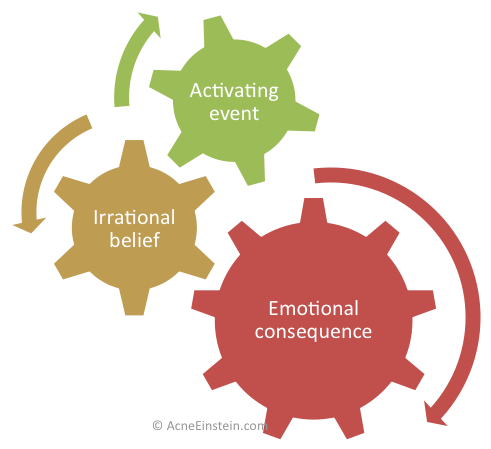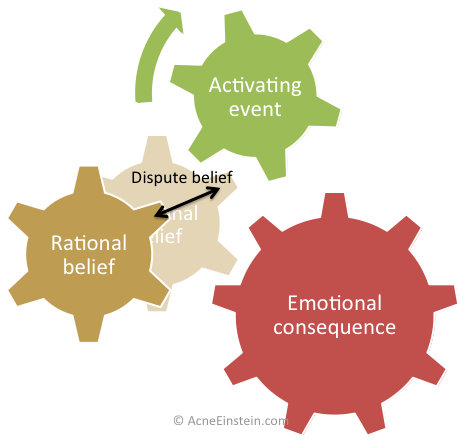Rational emotive behavior therapy, or REBT, is a form of cognitive behavior therapy developed by Dr. Albert Ellis in 1955.
Earlier in this chapter, I made the claim that it’s not acne per se that causes your emotional pain – it’s how you react to acne. We talked about how people with acne pay more attention to their skin problems, and that this selective attention to the perceived flaws causes the emotional pain. All of this stems from core beliefs that are you somehow ugly, unworthy, or otherwise undeserving.
REBT is a way to systematically challenge these dysfunctional beliefs and thus change how you react to acne.
The foundation of rational emotive behavior therapy is the “ABC model.” The ABC model is a mnemonic device used to explain the connection between a given stimulus and our thoughts/feelings/beliefs about that stimulus, and how this connection leads to a given result. This is a summary of the ABC model according to Ellis’ REBT approach to therapy:
- Activating or adverse event
- Beliefs surrounding this adverse event
- Consequences resulting from the event and our beliefs about it
This simple graph explains the REBT model.

REBT intervention consists of finding, disputing, and replacing the irrational beliefs with more rational ones.

One reason I like REBT is that recognizes that some “negative” emotions are both healthy and rational responses to life events. Let’s say that you hear rumors that the company you work for is in financial trouble and thinking of laying out staff. It’s normal in this situation to be concerned and worried about your future. This thinking becomes irrational, even pathological, when you become terrified that you’ll not only lose your job but end up living under a bridge.
Similarly, it’s okay to be concerned about your skin. Because it’s obviously not irrational to think that having acne makes your life more difficult in some ways. This thinking becomes irrational when you believe and feel that having acne makes your completely worthless and that nobody could ever accept you because of acne.
This is mirrored in the differences between irrational and rational beliefs. Irrational beliefs are almost always rigid and absolute, such as:
- X must happen
- I have to achieve X
- X must not be so
Dr. Ellis calls this kind of thinking as musturbation. These beliefs are followed by consequence beliefs and thinking, such as:
- Awfulization – If X doesn’t happen, then something truly awful will take place.
- Low frustration tolerance – Something is intolerable, can’t stand something, this is too hard.
- Global rating – Applying global rating on yourself or others when X doesn’t happen.
To give some concrete examples, I again dived into the Emotional and psychological effects of acne sub-forum at acne.org. I think real words used by people with acne help to illustrate how this works.
One poster asked whether it’s possible for someone with acne/scars to find love.
I know for sure guys notice my acne and although I do still get checked out and noticed by guys from time to time (I’m very good at covering up with makeup although it kills me inside everytime I have to wear my mask) I am just not sure if it’s possible to find a lasting relationship while you have acne.
A REBT session could go like this:
- I hate it when I have to wear makeup when I go out on a date.
- Why is that?
- Because it makes me a fake, and I’m afraid what happens when they seem me without my mask.
- What do you think would happen?
- They would see my acne and run away (Awfulizing).
- Why do you think that?
- Because it makes me look horrible, and guys only like pretty women (More awfulizing), and I don’t think anyone could love someone with acne like mine (Even more awfulizing).
- Why do you think that?
- Because it makes me horrible (Global rating).
Another poster replied to the discussion.
Been married 5 years come March. My husband has only known me as I am now, with acne and scarring. We have had some serious ups and downs in our relationship but he’s always told me he loves me. I don’t always believe him, and I don’t always trust him (my issues, whatever) but even when I feel hideous and have breakouts and so forth he always tells me I’m beautiful/sexy/everything you wanna hear.
This snippet doesn’t explicitly state all the beliefs, but it’s easy to see how a REBT session could go like this.
- I’m depressed, because no matter what I do, I can’t get over my acne. (Implied, I must get over my acne / I must have clear skin).
- What is it that bothers you about acne?
- Acne makes me hideous and ugly (Applying global rating hideous/worthless).
- But it seems like you have a loving husband who adores you?
- I’m afraid that one day he’ll wake up, realize what a monster I am, and leaves me (Awfulizing).
- Why is that?
- Because how could anyone love something as hideous as I am (More awfulizing and generalizing, nobody could ever love someone with acne like mine).
The goal of a REBT session is to identify, challenge, and replace such beliefs with more rational alternatives, such as:
- I would prefer to have clear skin, but I don’t absolutely need to have clear skin.
- Some people may find my acne unattractive and choose not to date me because of it, but many people can see past it and appreciate my other qualities.
- Acne is one aspect of me, and I may not like it, but it doesn’t define me. I have many other qualities people find attractive.
- There are many examples of people with obvious disfigurements (even bigger than mine) finding love and happiness.
Rational beliefs are often expressed as preferences. They acknowledge that we would like something to be true, but they also recognize the fact that it may not happen, and that it’s OK.
You can dispute irrational beliefs with three types of questions:
- Empirical/scientific dispute – Ask yourself if there is evidence or proof that this belief is true.
- Functional dispute – Ask yourself whether the belief makes your life better or worse. Does believing it help or harm you. Is your life better with or without the belief?
- Logical dispute – Does this belief seem logical? Does it ring true to common sense?
In most cases you can clearly see that there’s no evidence to show the belief is true, it harms your life, and it’s illogical.
Simply realizing this is often enough to start making a difference in your life. But it’s by no means enough. We’ve often spent years with the irrational beliefs, and they’ve been ingrained into our psyche. It’s likely that the same activating event will still trigger the old emotional response. You have to repeatedly correct and remind yourself until the new beliefs take hold.
That’s why it’s a good idea to write down both the irrational beliefs you identified and their rational alternatives.
Use inference chaining to uncover irrational beliefs
One thing you can use to reveal irrational beliefs and consequences is called inference chaining. Ask yourself questions like:
- So what?
- What does that mean?
- What would happen next?
- Why do you say/think that?
Learn more
There’s no way I can comprehensively cover REBT in this article, and this should be considered as an introduction. If REBT sounds like something you would like to try, and I highly recommend you do, I can point you to further resources.
Youtube has several videos about REBT. Unfortunately, most of them are not very good, but the following two interviews should help to better explain REBT.
You can also find videos of staged REBT sessions on YouTube. They seem a bit fake, but you can get the basic idea of the kinds of questions to ask yourself.
I can also recommend two books about REBT. They do a much better job of explaining REBT and give you exercises to apply REBT on your life:
- How To Stubbornly Refuse To Make Yourself Miserable About Anything-yes, Anything by Albert Ellis
- Reason to Change: A Rational Emotive Behaviour Therapy (REBT) Workbookby Windy Dryden
I believe either of the above books will serve you well. Reason to Change contains more exercises and is more workbook like than the other book. I’ve read both books and can recommend either.
For those who want to work with a therapist, the Albert Ellis Institute lists dozens of therapists trained in REBT. You can find the listing here: https://albertellis.org/find-therapists/. I’m sure you can find therapists nearby you using Google. Many therapists also do sessions over Skype or phone.
